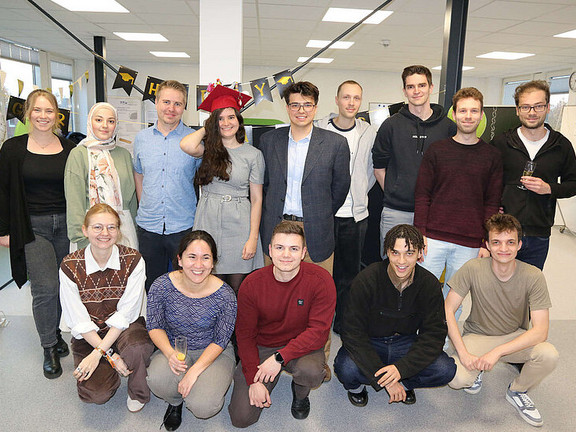Carina Newen defends the Research Center’s first PhD thesis
- News
- Research Alliance Ruhr

Carina Newen brought her doctoral defense to a successful close, her accomplishment became both a personal success and a significant moment for RC Trust. As the first PhD candidate to complete her doctorate within the Research Center Trustworthy Data Science and Security, she embodies what the center was created for – excellent, interdisciplinary research on trustworthy AI in an environment that connects three universities, multiple disciplines and society at large.
In her thesis, “Uncertainty Quantification for Interpretable and Reliable Machine Learning”, Newen asks a question that concerns everyone from policy-makers to industry partners and citizens: when can we rely on AI systems – and how can they show us that we really can? To answer this, she combines three research strands that usually run in parallel: explainable AI (making model decisions understandable), robust AI (making models stable under changing conditions) and uncertainty quantification (measuring how sure or unsure a model is about its predictions). By bringing them together, she develops methods that do not just output a result, but also make clear how confident the system is and why – a crucial prerequisite for calibrated trust.
Newen’s path also highlights what makes RC Trust unique as part of the Research Alliance Ruhr. The center brings together expertise in machine learning, data science, cybersecurity and psychology – and connects researchers across TU Dortmund University, Ruhr University Bochum and the University of Duisburg-Essen.
For doctoral researchers, this means access to supervisors and collaborators from different disciplines, joint seminars and a graduate school that treats trustworthy AI not only as a technical challenge, but as a societal one. Newen’s collaborations, especially at the intersection of psychology and computer science/statistics, grew directly out of this setting and shaped both her thesis and her publications.
Prof. Dr. Emmanuel Müller, founding director of RC Trust and Newen’s doctoral advisor, played a central role in creating these conditions. Under his leadership, the center established an environment in which ambitious PhD projects can connect rigorous algorithms with real-world questions about trust, regulation and social impact.
Events with partners from politics, administration, industry and civil society, as well as citizen-science formats, ensure that research on trustworthy data science and security does not remain abstract but is tested against concrete needs – from medical applications and mobility to public administration.
For students considering a PhD, Newen’s story shows what is possible when a research center is designed around collaboration: technical methods are developed in close dialogue with psychological models of trust, philosophical analysis and societal expectations. For researchers and policy-makers, her work offers conceptual and mathematical tools to judge when AI systems deserve trust – and when they need to be improved before they are deployed at scale. And for the broader public, her success sends an important signal: trustworthy AI is not a slogan, but the result of careful research carried out under conditions that allow different disciplines to learn from each other.
With Carina Newen’s successful defense, RC Trust celebrates its first “home-grown” doctorate – and at the same time sets the bar for many more PhD projects that will help shape the future of reliable and responsible AI in the Ruhr region and beyond.
